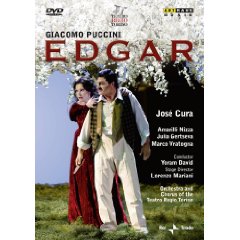Edgar has always been the odd man out in the Puccini canon, lying well outside the standard rep. The recent discovery of forty minutes of additional music is likely to do little to change that, but the find was momentous enough to merit a world premier of the newly restored Four Act version of Puccini’s second opera at the Teatro Regio Torino in 2008, with José Cura in the title role. Unfortunately, not even the draw of new old music — and more Puccini is always a good thing — is enough to make this DVD (Arthaus Musik 101377
) a must-have for anyone but a Puccini compleatist.
First, a bit of background for those who may not be familiar with the semi-obscure piece. The basic plot, heavily inspired by Carmen and Tannhauser, goes thusly: Boy (Edgar) loves Girl (the aptly-named Fidelia) but is seduced by Evil Gypsy (the also aptly-named Tigrana) and runs away with her, setting his house on fire as he goes for no particular reason.
A few months later, Boy gets sick of the endless parties and orgies with Evil Gypsy and enlists in the armies, leaving the rest of us to wonder how someone can actually get sick of orgies. He pretends to die in battle and shows up at his own funeral, disguised as a monk, and slanders himself, bribing Evil Gypsy to do the same. Girl defends seemingly dead Boy, who reveals himself, sending the chorus into a tizzy. Boy and Girl reunite just in time for Evil Gypsy to stab Girl in revenge. The end. Let’s just say there’s a reason Puccini rewrote the opera twice, in the process shortening it from four acts to three.
Torino’s production, conducted in an accessible, inoffensive performance by Yoram David, goes back to the original four act-structure, but the production, directed by Lorenzo Mariani, fails to flesh out Ferdinando Fontana’s weak libretto. Mariani moves the opera from 1300s Flanders to Italy at the time of the opera’s composition, which doesn’t serve much purpose except to dress the chorus in all-white Victorian wear. The unit set (like the costumes, by Maurizio Baló) is a grassy knoll with huge black pillars jutting oddly out from the ground. There is a lot of rolling around in the grass, and plenty of driving the point home: Fidelia (who is effectively Elisabeth with less spine) wears white, Tigrana (Carmen on steroids) is in red and black, and we know that Edgar is torn between them because he is the only man onstage wearing a colored vest over his white pants.
Risibly, when Tigrana enters the garden-like setting she immediately bites into a very symbolic apple. The second act orgy is even sillier, taking place in a high-class brothel run by Tigrana while Edgar stumbling around in a smoking jacket singing his aria while surrounded by Victorian tarts wearing devil masks. Things liven up a bit for the funeral sequence in act three, but after that the tension lags and the climactic stabbing is so clumsily staged as to invoke disbelief.
The performers muddle through as best they can, and most of the singing is pretty good. Cura, his powerful voice now showing signs of strain, sings with sensitivity but fails to make anything out of Edgar’s bland torment. He wears an unflattering moustache throughout, apparently to resemble the composer. Amarilli Nizza’s Fidelia begins the opera sounding sluggish and wobbly, but returns in act three for an exquisitely phrased “Addio mio dolce amor.” Her acting is strictly in the “I am an Italian diva, watch me run around the stage” school, and she spends too much time crawling around in the grass.
Vocal honors go to Marco Vratogna as Fidelia’s brother Frank, who also serves as both Edgar’s best friend and rival, thus fulfilling all three purposes of an Italian grand opera baritone at once. His act one aria “Questo amor, vergogna mia” is probably the best singing on the disk. Carlo Cigni does what he can with the barely-there role of Fidelia’s father Gualtiero (are all Italian opera basses with soprano daughters named Gualtiero or is it just me?). As Tigrana, mezzo Julia Gertseva (who looks distractingly like Anna Netrebko), acts the role to perfection, making the two-dimensional baddie unexpectedly sympathetic, but has a pronounced spread in her upper register.
As for technical aspects, the sound favors the principles over the chorus too much, and the subtitles are laughably bad. My favorites: “I am sick of this mollycoddled life!” and “Hell and malediction!” The camera work is mostly well done, saved for ill-advised flashbacks displayed during the lengthy act four prelude.
As for the “world premier edition”, I’m of two minds on the changes. On one hand, much of the new music helps to flesh out the characters beyond cardboard cut outs and much of it is glorious. The main restoration, a lengthy love duet between Fidelia and Edgar, is so good that some of it got reused in act three of Tosca. On the other hand, the fourth act makes the opera too long. The new music serves the video by making it a curio rather than another middling DVD of an obscure opera. If you must have an Edgar in your home video collection, you could do worse, but on the clumsy, unsubtle productions makes the two-hour work seem as long and dull as a poorly done Wagner opera. Puccini, even obscure Puccini, deserves better.



